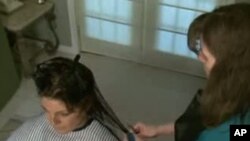Faced with a life-changing tragedy, it would be easy for Martha Clements to focus on the negative. But that's not her way. Five year after losing her vision, Clements is back doing what she loves - styling hair.
Back to work
“It is long, oh my goodness, Kathy Braga,” Clements says, running her hands down the length of her client’s hair.
Braga is letting it grow. It now hangs below her shoulders and down her back, and all she wants is a trim, so she asks Clements to show her how much an inch would be.
Clements pulls a ruler from a drawer at her work station and holds it up to Braga’s hair in front near her face. “Right here. An inch will be right here at your chin.”
Clements was a hairstylist for about 10 years before losing her vision. Now, when she begins cutting, it's easy to forget that Clements is completely blind. She carefully compares the length of each strand of hair, relying on her sense of touch. Ultimately, she asks her client to “be her eyes” and check her work.
After a careful inspection, Braga gives her approval. And after Clements blows her hair dry, remarks, “You made me younger…I love it.”
Clements had been doing Braga’s hair for years before she became blind. Braga is proud to say she was Clements’ first customer after she lost her vision.
“She sat me in the kitchen. It was dark, and she said, ‘Are you ready?’ I said, ‘I’m ready.’ And that is when she took this little razor thing, and she said, ‘Look and see if there is hair on the ground,’ and I said, ‘Yes, there is.’ And she said, ‘Okay, I have the right end of the thing.’”
Brush with death
Clements was 42 years old when she suffered a pulmonary embolism that cost her her sight.
“I was dead for 20 minutes first and then half an hour, and the lack of oxygen killed my optical nerve.” The last thing Clements remembers that day was the ambulance coming to get her. “I was gasping for air. I couldn’t breathe. The next thing I remember was waking up three day days later, blind, in the hospital.”
Her ribs had been broken when they resuscitated her. Her shoulder was dislocated. She had to undergo nine months of physical therapy.
"It was the hardest time in my life," she says, because when she lost her sight, it affected all of her senses. “Everything changed in my life: distance, smell, sounds. My kids didn’t sound the same. My husband didn’t sound the same. I didn’t know my home. It took me three months to find the coffee table.”
Learning to adapt
Once a month, a teacher from the Virginia Center for the Blind came to her home in Woodbridge, about 40 kilometers from Washington.
But Clements was eager to learn more. So in 2008, she left her husband and teenage sons, to go to the Virginia School for the Blind in Richmond for a nine-month program. “My plan was to be able to do for my family again, to do what I like to do, cook, clean, make phone calls.”
She learned basic skills like how to navigate with a cane, how to listen and how to eat different foods like spaghetti. There were classes in Braille, computer skills and using different gadgets designed for the blind.
Graduates of the program are expected to leave with not only life skills, but a marketable skill as well, which initially posed a problem for Clements.
“My teacher asked me, why wouldn’t I do hair. I said, ‘Hello. Blind. No, no, no.’ I was scared to think I could even do it.”
But gradually, Clements gained confidence and by the time she graduated, had styled 100 heads of hair at the school. “People from headquarters came, people from the library, students, secretaries, teachers, friends. Everybody came and let me do their hair.”
Clements now sees clients in her home.
Still grateful
Three days a week she leaves home to volunteer at the House of Mercy, a Catholic service organization that provides clothing, food and other support to the poor. Many of the clients, like Clements, who was born in Mexico, are native Spanish speakers.
While she talks with them and translates for others, Clements’ hands are busy making rosaries, used by Roman Catholics to count prayers.
Kellie Ross, executive director of the House of Mercy, remembers when Clements first showed up with her friend, Kathy Braga, to offer her help.
At first, she says, she had no idea Clements was blind. “As she started to walk I realized she couldn’t see, and I was like ‘Wow,’” Ross recalls. “She could have taken that tragic experience of losing her sight and gone inward, and instead she used that experience to help other people who are suffering.”
Clements says she feels blessed today, five years after her brush with death.
“I thank the Lord every day for my blindness, because I’m alive,” she says. “I could have been dead. I’m alive. I’m healthy, and that is what matters.”




